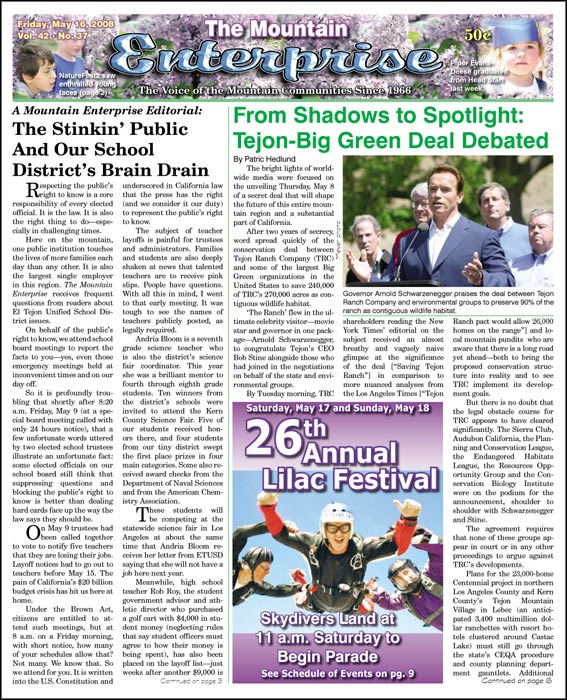
Andria Bloom guided local students to their highest levels of achievement yet in regional science fair competitions this year. Her coaching and challenges to students led five students to return with honors, including four first place winners. But while these students are competing in the California State Science Fair next week, Bloom will be receiving a pink slip telling her she no longer has a job here.
Respecting the public’s right to know is a core responsibility of every elected official. It is the law. It is also the right thing to do—especially in challenging times.
Here on the mountain, one public institution touches the lives of more families each day than any other. It is also the largest single employer in this region. The Mountain Enterprise receives frequent questions from readers about El Tejon Unified School District issues.
On behalf of the public’s right to know, we attend school board meetings to report the facts to you—yes, even those emergency meetings held at inconvenient times and on our day off.
So it is profoundly troubling that shortly after 8:20 a.m. Friday, May 9 (at a special board meeting called with only 24 hours notice), that a few unfortunate words uttered by two elected school trustees illustrate an unfortunate fact: some elected officials on our school board still think that suppressing questions and blocking the public’s right to know is better than dealing hard cards face up the way the law says they should be.
On May 9 trustees had been called together to vote to notify five teachers that they are losing their jobs. Layoff notices had to go out to teachers before May 15. The pain of California’s $20 billion budget crisis has hit us here at home.
Under the Brown Act, citizens are entitled to attend such meetings, but at 8 a.m. on a Friday morning, with short notice, how many of your schedules allow that? Not many. We know that. So we attend for you. It is written into the U.S. Constitution and underscored in California law that the press has the right (and we consider it our duty) to represent the public’s right to know.
The subject of teacher layoffs is painful for trustees and administrators. Families and students are also deeply shaken at news that talented teachers are to receive pink slips. People have questions. With all this in mind, I went to that early meeting. It was tough to see the names of teachers publicly posted, as legally required.
Andria Bloom is a seventh grade science teacher who is also the district’s science fair coordinator. This year she was a brilliant mentor to fourth through eighth grade students. Ten winners from the district’s schools were invited to attend the Kern County Science Fair. Five of our students received honors there, and four students from our tiny district swept the first place prizes in four main categories. Some also received award checks from the Department of Naval Sciences and from the American Chemistry Association.
These students will be competing at the statewide science fair in Los Angeles at about the same time that Andria Bloom receives her letter from ETUSD saying that she will not have a job here next year.
Meanwhile, high school teacher Rob Roy, the student government advisor and athletic director who purchased a golf cart with $4,000 in student money (neglecting rules that say student officers must agree to how their money is being spent), has also been placed on the layoff list—just weeks after another $9,000 is said to have been lost from student accounts under his watch.
At that Friday meeting of the trustees, I asked to pose a question that many of you have asked me: If a position opens up after the layoff notices are sent so the district is able to re-hire a teacher, is it really true that seniority—not talent and achievement—decides who can be asked to return?
Andria Bloom, for instance, is low on the seniority totem pole. "Last hired, first fired" is a rule used by administrators to make such decisions. Roy, on the other hand, has tenure. He could be eligible to be quickly re-hired.
Without mentioning names, I asked if it was possible that a teacher with seniority might be rehired before a newer teacher who had guided district students to distinction.
"We don’t want questions," Trustee Paula Regan said.
"You may not want them, but the public will still have them," I said. "These are difficult issues for everyone."
"I don’t want any questions in the stinkin’ newspaper," Trustee Cathy Wallace chimed in.
"You just said you don’t want questions from the ‘stinkin’ public,’" I said, rising to leave the meeting.
In fairness, we should all remember that the hiring and layoff of teachers are governed by a complex structure of union contract agreements and civil law. Confidentiality regarding most personnel issues is closely protected.
That said, school board trustees must maintain a keen respect for this fact: the public cares passionately about the quality of the teachers guiding their children.
As long as parents care about their children, the public will have questions to ask school board trustees.
And as long as the public has questions, you can be sure that this "stinkin’ newspaper" will continue to fulfill its responsibility to the stinkin’ public’s right to know—just the way the law provides for us to do.
-Patric Hedlund, Editor
The Mountain Enterprise
This is part of the May 16, 2008 online edition of The Mountain Enterprise.
Have an opinion on this matter? We'd like to hear from you.


